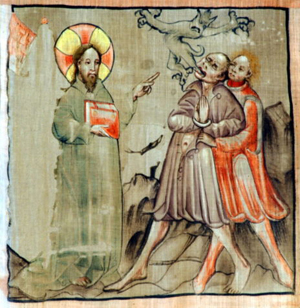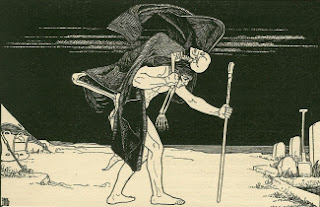Prolog
There it is now, the knife, right in the heart of the old Reb Groshkover and as a movie viewer you are literally waiting for the blood that seep from his chest, if not even inject.
And then it has to show, if he really is a Dybbuk, as the wife Dora of the trader Velvel meant, who had rammed the knife into the heart of the Reb.
She is suspicious of the old man because she has been told that he actually died of typhus three years ago and that the Shiv'a (the week of mourning) was held in orthodox fashion. How then, three years later, can he sit in front of Dora and Velvel and pretend that he is the Reb Groshkover?
On the other hand, if he was a Dybbuk, what would a knife in his chest do? Can not a Dybbuk be killed? Or can you just drive him out?
And then the question arises:
What is a Dybbuk anyway?
The latter knows, in principle, anyone who has read a little in the New Testament. For example, in Mark 5:
 "And they came to the other side of the sea in the region of Gerasener. And as he got out of the boat, a man ran from the graves to meet him with an unclean spirit. He had his apartment in the burial caves. And nobody could tie him anymore, not even with a chain; for he had often been tied to his feet with chains and chains and had torn his chains and shattered his shackles; and nobody could restrain him. And he was always, day and night, in the tombs and in the mountains, screaming and pounding stones. "
"And they came to the other side of the sea in the region of Gerasener. And as he got out of the boat, a man ran from the graves to meet him with an unclean spirit. He had his apartment in the burial caves. And nobody could tie him anymore, not even with a chain; for he had often been tied to his feet with chains and chains and had torn his chains and shattered his shackles; and nobody could restrain him. And he was always, day and night, in the tombs and in the mountains, screaming and pounding stones. "The unclean spirit turns out to be a legion of spirits asking Jesus to give them a space (that's what they call it today), a space outside the possessed person, and Jesus refers them to a group of pigs who promptly panic Commit suicide. (But even then, the ghosts would have to search for new bodies again, but nothing is said in the New Testament).
 So, a dybbuk is nothing new for Christian readers, much less for Jewish readers. Gershom Scholem concludes: "Stories about dibbukim are common in the time of the Second Temple and the Talmudic periods, especially in the Gospels." Dybukks became really popular only in Eastern Europe in the 16th century. Actually, they are initially demons that take possession of other people, then it is designed to be ghosts of the dead who have not gone to rest / hell and therefore became demons and take possession of other living beings. These demons can be cast out but almost without damage to the possessed. The Encyclopædia Britannica sums it up like this:
So, a dybbuk is nothing new for Christian readers, much less for Jewish readers. Gershom Scholem concludes: "Stories about dibbukim are common in the time of the Second Temple and the Talmudic periods, especially in the Gospels." Dybukks became really popular only in Eastern Europe in the 16th century. Actually, they are initially demons that take possession of other people, then it is designed to be ghosts of the dead who have not gone to rest / hell and therefore became demons and take possession of other living beings. These demons can be cast out but almost without damage to the possessed. The Encyclopædia Britannica sums it up like this:Dybbuk, also spelled dibbuk, plural dybbukim, in Jewish folklore, a disembodied human spirit that, because of former sins, wanders restlessly until it finds a haven in the body of a living person. Belief in such spirits was especially prevalent in 16th–17th-century eastern Europe. Often individuals suffering from nervous or mental disorders were taken to a miracle-working rabbi (baʿal shem), who alone, it was believed, could expel the harmful dybbuk through a religious rite of exorcism. Isaac Luria (1534–72), a mystic, laid the grounds for Jewish belief in a dybbuk with his doctrine of transmigration of souls (gilgul), which he saw as a means whereby souls could continue their task of self-perfection. His disciples went one step further with the notion of possession by a dybbuk
The 'modern' Dybbuk of the Salomon An-ski
In modern times, the Dybbuk gets its popularity through a play by the Jewish writer Salomon An-Ski. Almost all of today's Dybbuk speeches refer to it. The play tells the story of a woman's obsession with the evil spirit of her dead lover. The piece played at the end of the 19th century in Wolhynia (northwestern Ukraine) in the area that was then assigned to the Jews for settlement and in which they had a population share of 10-15%. At first, in an old synagogue, some men tell stories of famous Hassidic zaddikim. Then comes Chanan, a yeshiva student who tells them about Leah, a daughter of the trader Sender, in whom he is in love, but was rejected by the father for his poverty. Now when the dealer appears and announces that he has promised his daughter to the applicant Menasche, Chanan crashes dead to the ground. A few months later Lea is to marry. She tells her old nurse that the dead Chanan has appeared to her in a dream. As the groom tries to lift the bride's veil during the ceremony, she pushes him back - a man's voice screams out of her. She seems obsessed with a dibbuk. The Zaddik of Miropol takes on the task of liberating Lea from her mind. But the dibbuk refuses to comply with the request. The Zaddik recognizes him as Chanan and asks a Rabbinic court to ban him. Court President Rabbi Samson appears and explains that in the dream, the ghost of Nissan, the father of Chanan, appeared to him and accused the dealer Sender before the court because he was responsible for the death of his son. Nissan's soul appears in court and announces to those present: Nissan and Sender were good friends and vowed that if one became the father of a son and the other father of a daughter, they should marry each other. Nissan died a year after the birth of his son Chanan, but this came to Brinitz and fell in love with Lea. Nissan accuses Sender of despairing Chanan by his rejection, which he then turned to the "other side." The court frees Sender from the charge of vows, as no one can dispose of an unborn creature, but tells him to leave half of his possessions to the poor and to pray daily for the Kaddish for Nissan and Chanan. While the holy zaddik is performing an exorcism, the dibbuk finally leaves Lea's body. The wedding with Menasche is being prepared. Lea speaks with the spirit of Chanan and confesses that she has loved him since the first sight. Her soul leaves her body, and Lea and Chanan are united in death.
Thus, the basic constellation of characters in the story of the phenomenon of Dybbuk is given: we do not have a ghost in front of us, haunting the world on its own, but a spirit that takes possession of others, and indeed of people, to which he is one certain relationship stands. Common to both ideas is that it is a kind of "unredeemed souls" who have not found their peace. The solution, therefore, in both cases, is to help the souls to their final place (in heaven or hell).


No comments:
Post a Comment